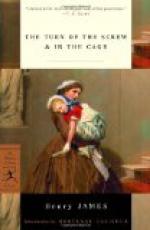This was all the greater reason for going on. “I mean instead of Burfield’s.”
Our young friend fairly pitied her; she had made her in an instant so helpless, and yet not a bit haughty nor outraged. She was only mystified and scared. “Oh, you know—?”
“Yes, I know!” Our young friend smiled, meeting the other’s eyes, and, having made Juno blush, proceeded to patronise her. “I’ll do it”—she put out a competent hand. Her ladyship only submitted, confused and bewildered, all presence of mind quite gone; and the next moment the telegram was in the cage again and its author out of the shop. Then quickly, boldly, under all the eyes that might have witnessed her tampering, the extraordinary little person at Cocker’s made the proper change. People were really too giddy, and if they were, in a certain case, to be caught, it shouldn’t be the fault of her own grand memory. Hadn’t it been settled weeks before?—for Miss Dolman it was always to be “Cooper’s.”
CHAPTER XIV
But the summer “holidays” brought a marked difference; they were holidays for almost every one but the animals in the cage. The August days were flat and dry, and, with so little to feed it, she was conscious of the ebb of her interest in the secrets of the refined. She was in a position to follow the refined to the extent of knowing—they had made so many of their arrangements with her aid—exactly where they were; yet she felt quite as if the panorama had ceased unrolling and the band stopped playing. A stray member of the latter occasionally turned up, but the communications that passed before her bore now largely on rooms at hotels, prices of furnished houses, hours of trains, dates of sailings and arrangements for being “met”; she found them for the most part prosaic and coarse. The only thing was that they brought into her stuffy corner as straight a whiff of Alpine meadows and Scotch moors as she might hope ever to inhale; there were moreover in especial fat hot dull ladies who had out with her, to exasperation, the terms for seaside lodgings, which struck her as huge, and the matter of the number of beds required, which was not less portentous: this in reference to places of which the names—Eastbourne, Folkestone, Cromer, Scarborough, Whitby—tormented her with something of the sound of the plash of water that haunts the traveller in the desert. She had not been out of London for a dozen years, and the only thing to give a taste to the present dead weeks was the spice of a chronic resentment. The sparse customers, the people she did see, were the people who were “just off”—off on the decks of fluttered yachts, off to the uttermost point of rocky headlands where the very breeze was then playing for the want of which she said to herself that she sickened.




